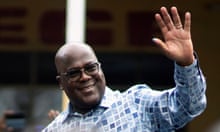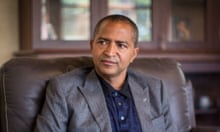Police and demonstrators have clashed in the Democratic Republic of the Congo, in the latest round of violence sparked by the ongoing political crisis in the troubled central African state.
Opposition groups said more than 50 people died on Monday in clashes in the capital, Kinshasa. The government said at least 17 people had been killed but warned that the toll could rise further.
Witnesses said protesters had beaten at least one police officer to death.
Four people were also killed when the headquarters of three DRC opposition parties were torched overnight and early on Tuesday, Agence France-Presse reported.
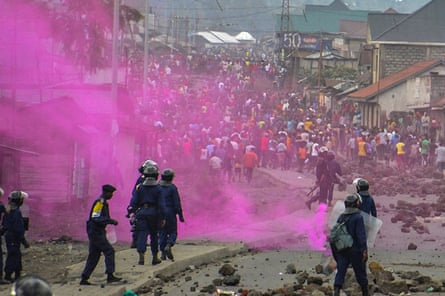
The DRC has suffered repeated bouts of unrest since the president, Joseph Kabila, announced that elections scheduled for later this year would be delayed.
Opponents say Kabila, whose second term in power expires in December, is trying to cling to power undemocratically. His supporters say logistical and financial constraints mean it is impossible to hold fair polls as planned.
A witness from the Reuters news agency said police had fired into the crowd in Kinshasa.
Bruno Tshibala, a spokesman for an opposition party, said activists had recorded several deaths and that he had seen four bodies piled up in the office of an allied faction.
Kabila took over as leader of the DRC less than two weeks after his father, Laurent, was shot by a bodyguard in the presidential palace in 2001. He was elected president in disputed polls in 2006 and again in 2011. The DRC’s constitution bars a third term.
Western states, including the US, have told Kabila to stick to the election calendar.
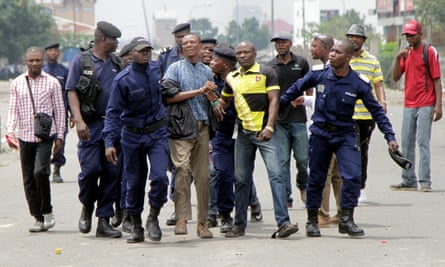
Kabila’s backers and some opposition members announced an agreement on the timing of elections last week. Alexis Thambwe Mwamba, the justice minister, said an interim government including members of the opposition would be formed and the election postponed until mid-2017.
“The government will be redone. We will put in place a government that we will co-manage between the presidential majority, the opposition and civil society,” Mwamba said.
Most major opposition parties have boycotted the discussions and it appears unlikely the announced agreement will end the unrest. One point of contention is the timing of different sets of elections. Another is the revision of the electoral roll.
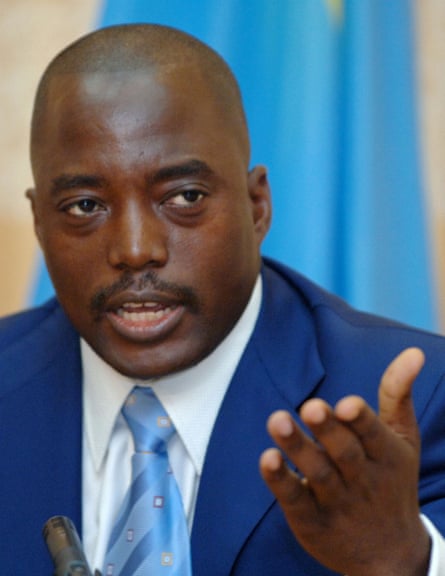
Kabila loyalists say problems with the electoral roll make it impossible to hold a fair poll this year. The current version is thought to exclude about half of the DRC’s 45 million potential voters, including about 7 million new voters who have come of age since 2011. Independent experts have said a complete revision could take 10-18 months.
Increasing US concern has prompted a diplomatic offensive by senior officials close to Kabila in recent weeks. Barnabe Kikaya Bin Karubi, who is Kabila’s chief diplomatic adviser, is in Washington on a “pleading mission” to Washington to press US officials not to impose sanctions against key political figures.
“There are two resolutions that were pending in the House to impose sanctions on Congolese officials,” Kikaya said last week. “My mission is to plead with American officials and to prove to them that sanctions are not a solution to help us resolve our problems.”
Kikaya denied that Kabila was seeking to stay in power and rejected accusations that the delay in the election was “purposefully engineered”.
The constitution “means a lot to him and he will not violate it”, Kikaya said.
Analysts say that whereas neighbouring strongmen Denis Sassou Nguesso in Congo-Brazzaville and Paul Kagame in Rwanda have easily pushed through constitutional changes to allow them to stand for third terms, Kabila has been unable to take such a blunt approach.
Kabila did manage to outmanoeuvre Moise Katumbi, a tycoon who was seen as a powerful challenger. Katumbi, who had built a support base in Katanga province, was forced to leave the country earlier this year to seek medical treatment. He too is lobbying foreign powers.
This article includes content provided by Google Maps. We ask for your permission before anything is loaded, as they may be using cookies and other technologies. To view this content, click 'Allow and continue'.
Observers differ over the potential for widespread conflict. The DRC’s sprawling borders reach nine other African countries, and it has been argued that an implosion in the vast country could spark instability in its neighbours.
Others say regional powers have little interest in sparking a violent battle to exploit the country’s resources.
Civil wars fuelled by foreign interference killed millions of people in DRC between 1996 and 2003.
The country is nearly two-thirds the size of western Europe and has a population of more than 79 million. Since it won independence from Belgium in 1960, there has never been a peaceful, democratic transition of power.


